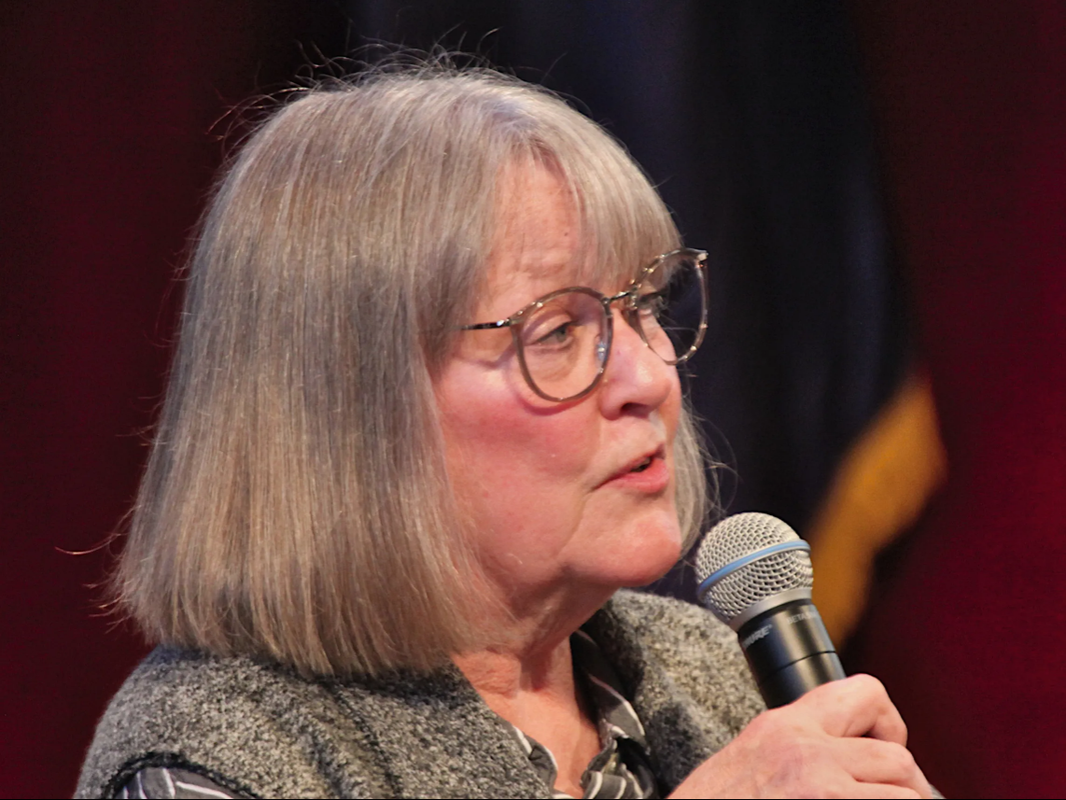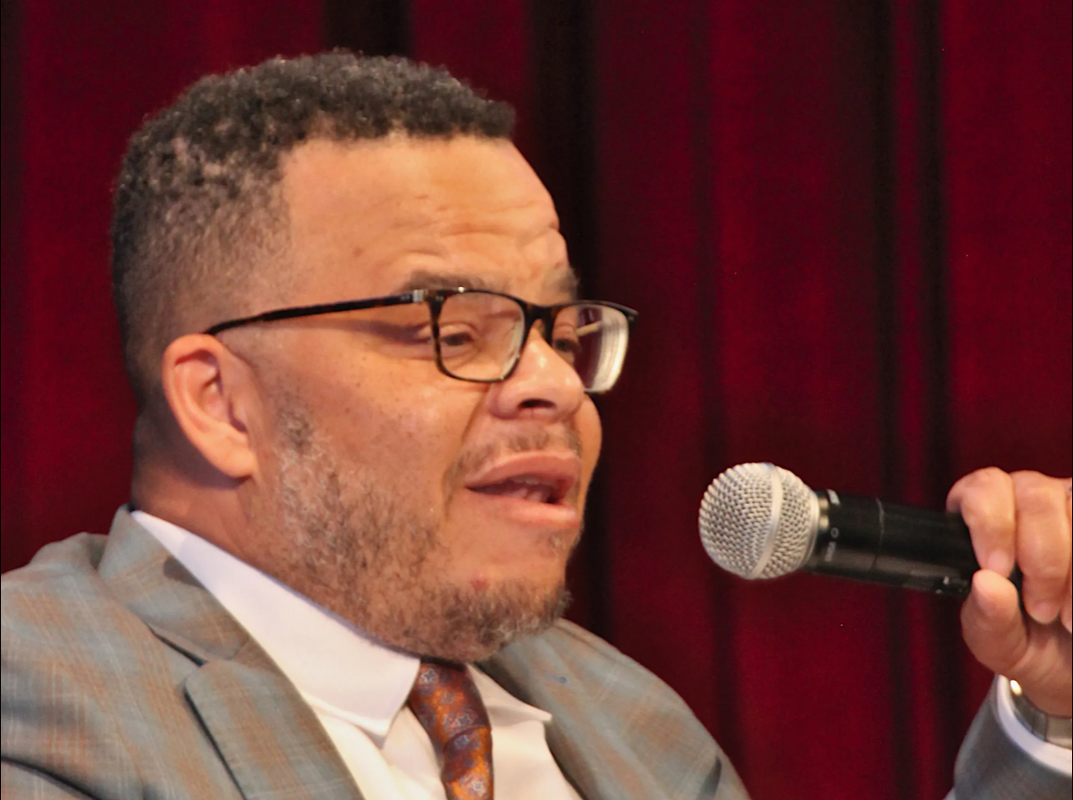|
NOTE: This article that highlights The Chamber's Elect Connect: Mayoral Forum on Business event was published on April 11, 2023 in the B Square Bulletin by Dave Askins. Photos are provided by B Square Bulletin. At a forum for mayoral candidates hosted on Monday night by the Greater Bloomington Chamber of Commerce, not a lot of new, additional daylight emerged between the three candidates as far as their known policy positions. But a sharp difference in perspective emerged in response to a couple of the questions—one involving public safety and another involving the working relationship between city and county governments. Moderating the forum was Paul Helmke, who was a three-term mayor of Fort Wayne, and is a professor of practice at Indiana University’s O’Neill School of Public and Environmental Affairs. Seeking the Democratic Party’s nomination for mayor of Bloomington are: Don Griffin, Susan Sandberg and Kerry Thomson Responding to a question about public safety, Sandberg said, “Crime is not being committed by our unhoused, per se. We talked about the nuisances, the needles and the vagrancy and the vandalism.” Sandberg added, “But the violent crime is being done by the big guys that are coming here from Indianapolis, Chicago and other places, selling this stuff to our victims—selling stuff to the addicted that we’re having a hard time with many of our unhoused populations.” Griffin, who had already answered the question, reacted to Sandberg’s remark as she was talking. He raised an open palm upward and a puzzled expression crossed his face. As soon as Sandberg stopped talking, Griffin started to give a rebuttal: “I’m sorry, when we talk about…” Time for rebuttal wasn’t a part of the ground rules. But Griffin got a chance to continue, after moderator Helmke paused Griffin, in order to tell the three candidates that they would have 30 seconds to follow up. Griffin’s response to Sandberg went like this: Don Griffin: When we talk about—I need us to change how we say things, right? When we talk about big city folks, it is a dog whistle, right? You put my 21-year-old Black child in danger, when you say that. I need us to stop saying that. You want to talk about recruiting and retention of people of color? Indiana University, IU Health, everybody that wants people of color to live here—they do not want to hear dog whistles about people from Detroit, or Indianapolis, living here. And that being the problem, that being the drug problem, or what have you. That’s got to stop. Sandberg reiterated her point: Susan Sandberg: The drive-by shootings are happening by the people coming here to sell the drugs to people—no offense meant by referring to where these individuals who are selling the drugs to our community are coming from. But once you talk to the Bloomington police department, you get a handle on where is the violent crime coming from, you’re gonna get an honest answer from that. We need to hear from them: What are causing increases in violence in our community? And why are they really strained to the breaking point because their staffing levels are so low? And it’s really hard to stay on top of all the criminal activity with the short-staffed department. In her followup remarks, Thomson focused on mental health and substance use disorder. Kerry Thomson: I’ll just go back to my comments that we do need a comprehensive plan for dealing with mental health and substance use disorder. And that plan needs to have the stakeholders at the table, people with lived experience, our incredible nonprofits. And the organizations that treat mental health for a living. Those are the folks we need at the table. In listening sessions that I’ve been doing since July, I am hearing more about this than any other issue. It’s time, Bloomington, and people want to help. In response to Sandberg’s remarks, at least one person walked out of the forum. The event was held in Presidents Hall—inside Franklin Hall on the Indiana University campus. In a recent interview given to Steve Higgs, working for The Bloomingtonian, Bloomington police chief Mike Diekhoff talked about the geographic origins of gun violence in Bloomington. Diekhoff said “There are social groups that are hanging out together that they may be a gang—we can’t prove that they’re a gang. But those are the types of things that we have seen.” In that interview, Diekhoff continued, “So these social groups coming from Chicago, Detroit that come to Bloomington for whatever reason, and there’s a lot of times they’re associated with gun crimes and these shots fired calls that we’ve had.” Answering a question about repairing city and county relations, Griffin led off like this: “On a daily basis, hundreds of opportunities where the city and the county and Indiana Indiana University working together, whether it’s the police, whether it’s fire, whether it’s streets—we have a great relationship.” Thomson, who answered the question after Griffin, said, “I’m frankly surprised to hear that the city-county relationship is fairly good. That’s not what we hear, as residents of Bloomington. And what we hear instead is: The executives are not speaking to one another.” Sandberg called the connection between the city and the county “a strained relationship.” She chalked it up to the issue of annexation: “I think much of it started with the whole issue of annexation being such a sudden and drastic shift. That was not I don’t think as respectful should have been with communicating with our county colleagues, before that was put forward.” Candidates fielded questions on a range of other topics, including: including priorities in their first 90 days; bureaucratic obstacles; annexation; public safety; making Bloomington a destination for young professionals; repairing intergovernmental relationships; governance structure for the convention center; expanding sewer service; maintaining open communication with the business community; ensuring proper accounting of finances; and plans for using the city’s new revenue. Verbatim responses to question about hiring police officers
Moderator Paul Helmke: According to the seventh annual public safety report, police calls are up 14 percent or so from last year, violent crimes up 5.8 percent, gun crimes rising. These are happening while the Bloomington police department is experiencing a shortage of sworn officers. If elected, will hiring more police officers be a priority for your administration? What is the ideal number of police officers to employ? And how are you going accomplish this? Don Griffin: Currently, we need 105 police officers. We have a brand new contract that just started on January 1 for the police. I think they made $70,000 a year starting out, $100,000 downpayment assistance for any police officer or even a fire person. We’ve got other things. I created a position that is a position for recruitment. We never had a person who would recruit constantly. The new police officers—the young police officers—they’re staying in communities at around two years or less, and they’re moving to something else. So we have to change how we recruit. I put a $35-million brand new police station—our police station that is going to be built in Showers complex. So we’ve got a lot of things to do—orr we’ve got a lot of things that have been done. I think the recruitment piece is going to change things. I think the higher salaries, a four-year contract that for everyone that starts at 70, and it goes between three and a half to five a year. I think we’re doing good work. Let’s see how it’s gonna work. Kerry Thomson: I’ve been a top level executive for 25 years—the most expensive thing you can do is lose somebody, then you have to replace them and train them. So I would start with retention of the great officers that we already have on our police force, while we’re working in tandem to try to hire the rest that we need. The city budget is allocated at 105 officers. But the studies I’ve read actually call for up to 120. We have never hired so many police officers, as we have during this administration—because we’ve never lost so many. So I hope that that recruitment officer is also doing exit interviews to find out what is causing people to leave. And I’ve done ride-alongs. I’ve talked to officers. I’ve listened to them. I know they didn’t want that new police station at Showers. And I know that there are other things that we can do. Pay is part of it. But we also have to look at the whole package. How are we retaining the people that keep us safe? And once we get them on board? How can we ensure that they don’t leave? Susan Sandberg: I have an outstanding relationship with the Bloomington police department and I have for several years now. When they first started sounding the alarm to us on the council that things were not well in their department with the amount of loss of the police officers. It is more than pay, but it is pay. We’ve got to be competitive in how we pay our officers, because we’re losing them. Well-trained, very mature, very good police officers, we’re losing them to other communities that do want to pay a competitive wage for police officers. We’re losing diversity hires to other communities who are also valuing that type of caliber of police officer. So we have a problem. We must recruit, we must retain, and how do we do that? By listening to the police officers, by hearing what they’re saying, listening to all the issues that they’re dealing with. And by the way, let me make another issue: Crime is not being committed by our unhoused, per se. We talked about the nuisances, the needles and the vagrancy and the vandalism. But the violent crime is being done by the big guys that are coming here from Indianapolis, Chicago and other places, selling this stuff to our victims—selling stuff to the addicted that we’re having a hard time with many of our unhoused populations. So to help fight crime, yes, we will get that police station and that police department up to speed. In a Sandberg administration. You can count on that. Don Griffin: I’m sorry, when we talk about… Moderator Paul Helmke: …Our next question was supposed to be on retention. A number of you touched on that. And I see there’s some follow up. I’ll give each of you another 30 seconds for further comments on what’s been talked about plus retention. Don Griffin: When we talk about—I need us to change how we say things, right? When we talk about big city folks, it is a dog whistle, right? You put my 21-year-old Black child in danger, when you say that. I need us to stop saying that. You want to talk about recruiting and retention of people of color? Indiana University, IU Health, everybody that wants people of color to live here—they do not want to hear dog whistles about people from Detroit, or Indianapolis, living here. And that being the problem that being the drug problem, or what have you. That’s got to stop. Kerry Thomson: I’ll just go back to my comments that we do need a comprehensive plan for dealing with mental health and substance use disorder. And that plan needs to have the stakeholders at the table, people with lived experience, our incredible nonprofits. And the organizations that treat mental health for a living. Those are the folks we need at the table. In listening sessions that I’ve been doing since July, I am hearing more about this than any other issue. It’s time, Bloomington, and people want to help. Susan Sandberg: The drive-by shootings are happening by the people coming here to sell the drugs to people—no offense meant by referring to where these individuals who are selling the drugs to our community are coming from. But once you talk to the Bloomington Police Department, you get a handle on where is the violent crime coming from, you’re gonna get an honest answer from that. We need to hear from them: What are causing increases in violence in our community? And why are they really strained to the breaking point because their staffing levels are so low? And it’s really hard to stay on top of all the criminal activity with the short-staffed. department.
0 Comments
Leave a Reply. |
Chamber NewsThis blog contains press releases, other news updates from the Chamber, news articles and radio interviews featuring interviews with the Chamber and team members, and much more! Categories
Categories
All
Archives
Archives
July 2024
|
|
Copyright The Greater Bloomington Chamber of Commerce. All Rights Reserved.





 RSS Feed
RSS Feed
